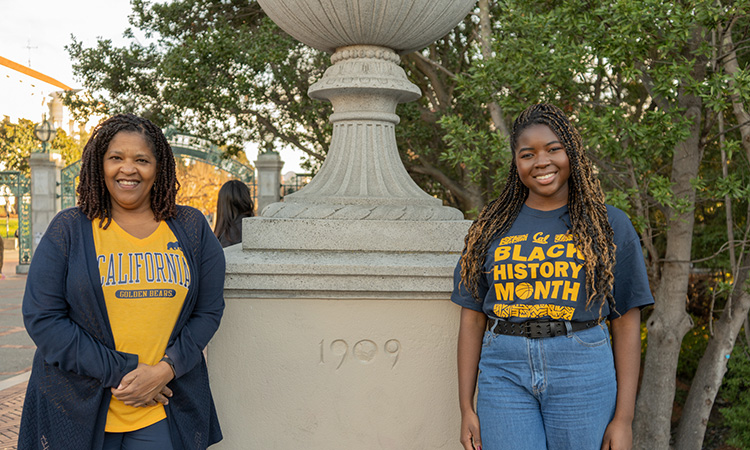
Research & Black Lives at Cal
As Black History Month begins, we’d like to highlight one of the Black organizations on campus: Black Lives at Cal (BLAC). I spoke with Gia White, a steering committee member, and Daniella Lake, an undergraduate research apprentice, and learned more about BLAC and the work they do on campus. Gia is also the Administrative Director of Global, International & Area Studies (GIAS) and the Institute of European Studies (IES). They also shared some recent projects they have been working on, including a self-guided audio tour of UC Berkeley’s Black history that is to be released in April for Cal Day. Read on to discover how you can get involved, and learn about more projects BLAC works on!
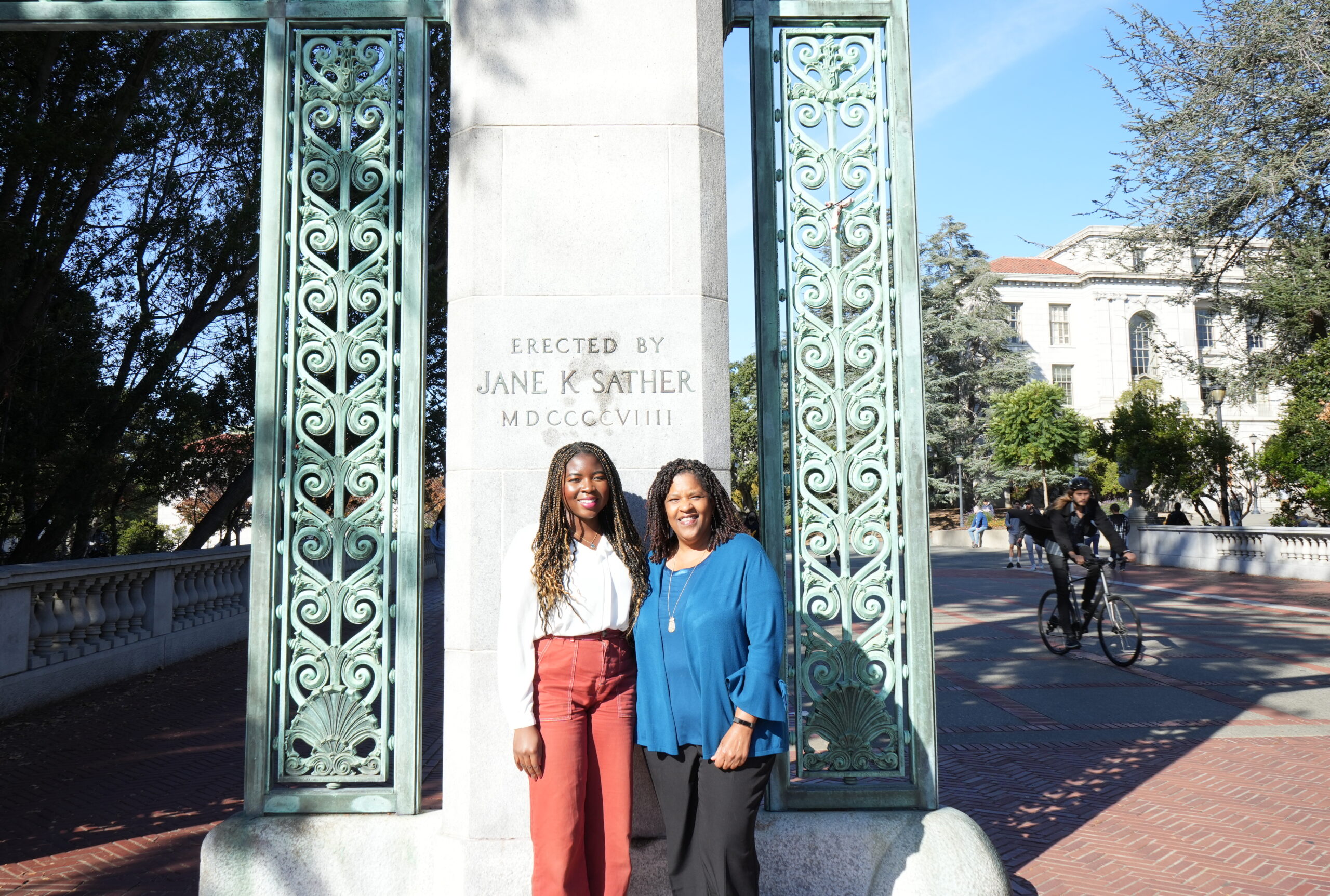
Daniella (left) and Gia (right) at Sather Gate. Photo by Jacqlyn Jones.
What is Black Lives at Cal?
Daniella: Black Lives at Cal (BLAC) is a multiyear initiative; it’s a collaboration between the African American Student Development Office and the Institute for the Study of Societal Issues. It researches and publicizes the Black history of our campus; our goal is to celebrate, defend, and advance the legacy of Black people at UC Berkeley. We conduct archival research, create content to help share the stories we uncover, and work on special projects.
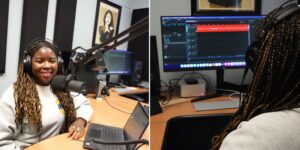
Daniella at Ethnic Studies Changemaker Podcast Studio. Photos by Jacqlyn Jones.
We have three teams that specialize on different projects in BLAC. One is a research team that works on archival research. They’re the ones discovering and looking for more information on Black history on campus. We also have a special projects team that works on events. The content team, which I lead, recently launched our Instagram account, @black.lives.at.cal here where we post weekly on topics like Black history figures, highlights of Black faculty and staff, and specific spots on campus and how Black history connects to them. Past posts have been about the naming of the MLK Student Union and the history behind Blackwell Hall’s name.
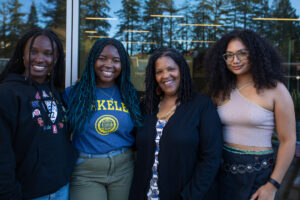
Members of the BLAC team. Photo by Brandon Sanchez Mejia.
How has participating in this program impacted the both of you?
Gia: I’ve worked on campus for a very, very long time, and I was a student before I became a staff member. This project has allowed me to weave together these amazing different experiences that I’ve had over a span of time in my career. I’m a full-time staff member but I get to contribute to the campus community in a very different way, one that is connected to my own personal history with Berkeley. It’s really wonderful and meaningful to work with Cal students of a different generation, and to help enhance that legacy for future students. We have some amazing students who have the passion for this and are developing skills as they work. They’ve brought a good sense of their own being to this project; we’re very fortunate to have this great cohort of students. We want this project and legacy to carry on, to be passed on to another generation, another class, that will take up the mantle and continue it.
Daniella: BLAC has been one of my most meaningful experiences here at campus. I know that I’m contributing to the Black community and the wider campus community, that students now will get to see our work and see and feel that they belong here; prospective Black students will learn about all these amazing people and alumni who are so accomplished that came before them. Being a part of this project has also given me a sense of community here on campus, and has allowed me to develop many professional skills. Getting to combine my passions in such an impactful way is so meaningful, and having creative freedom in all the things that we are doing is a great experience.
We often hear about imposter syndrome and how it impacts students of color and Black students, and through all these stories that we are uncovering we are showing we are not imposters. We all deserve to be here, and we’ve been making all these amazing contributions for years and years. So many firsts in California went here: the first Black federal judge in Alameda county, the first black female attorney in California. Knowing that I’m contributing to people having that sense of belonging is so incredible. It has also changed the way I view and understand Black history in general.
When we are taught Black history and education in school as children, we usually only learn about the Civil Rights Movement and Brown versus the Board of Education. It gives this idea that before the 1950s, Black and white people weren’t in school together. But uncovering our campus’ Black history has shattered that understanding for me — like learning that the first Black women graduated from UC Berkeley in 1909, so many decades before Brown versus the Board of Education, or that one of the first cohorts of Black women were on campus in the 1920s. Doing this project has been a learning experience for me, and learning about all of these amazing people doing things when all the odds were against them has also been empowering. Participating in this is like a full circle: I’m getting inspired by what I’m learning, and the things we’re doing are going to inspire more people.
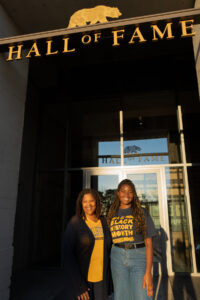
Gia and Daniella at Memorial Stadium. Photo by Jacqlyn Jones.
How did you find out about this project, and decide it was something you wanted to get involved in? Any advice for undergrads interested in research?
Daniella: I knew about the Undergraduate Research Apprentice Program (URAP), so I was already looking at different projects that were available to work on. I saw an email from Takiyah Jackson, the director of the African American Student Development Office about a URAP project called Black Lives at Cal, which was new at the time. When I read about it I realized it was perfect for me. I decided to apply, and I got in! There were just three undergrads when we started, and now our team has eleven. It’s been great to be here since the beginning and see it grow. If you’re interested, the application to apply for URAP for Black Lives at Cal opens at the beginning of every semester. You can find it listed under the projects section in the URAP website.
My advice is to find a project that you’d be passionate about; don’t just take on research for the sake of doing research. There are so many options that you can find something you really love and are excited about. When it comes to the actual research, sometimes it can seem daunting, and other forms can also be tedious at times. When we were doing archival research online, we were searching up key terms and sometimes over a thousand collections would appear and we would pick out the relevant ones. Thankfully, I never felt like I had a lot of pressure from the steering committee or anyone, and I knew I could rely on my team.
Gia: URAP opportunities do vary, but with BLAC, there is a grad student in charge who is such a great mentor for the undergrads. Caleb Dawson does amazing work, laying out how they can go about research, doing it from a graduate perspective and passing it on to undergrads. I think that’s the way it should be, in a safe environment where no one judges you. It’s a real contrast to when I was an undergrad. There wasn’t this kind of undergraduate research support. It’s really exciting to see the change.
Celebrate Black History All Year Round
Daniella: Through BLAC, we’re creating something that’s going to outlive us. When thinking about Black history, we are so used to focusing on the month as the time to celebrate it, but with BLAC you get to celebrate Black history all year round. Black history isn’t just reserved for February or reserved for Juneteenth. We can celebrate it all year round, because Black people exist all year round. And we can celebrate it through this project and other projects through BLAC and other organizations around campus.
Like Daniella said, BLAC makes it easier to celebrate Black history outside of the month of February. To stay connected to BLAC, make sure to follow their Instagram and keep a close eye on their website for upcoming events throughout the year. To learn about more Black history projects and events happening this month, visit the Division of Equity and Inclusion’s page on Black History Month.
Melissa Mora-Gonzalez is a second year student at UC Berkeley majoring in English. Feature photo by Jacqlyn Jones.
Want More?
- Read more about BLAC and the audio tour
- Discover all the Black Resource Center has to offer
- Learn about the BRRC and Black@Cal